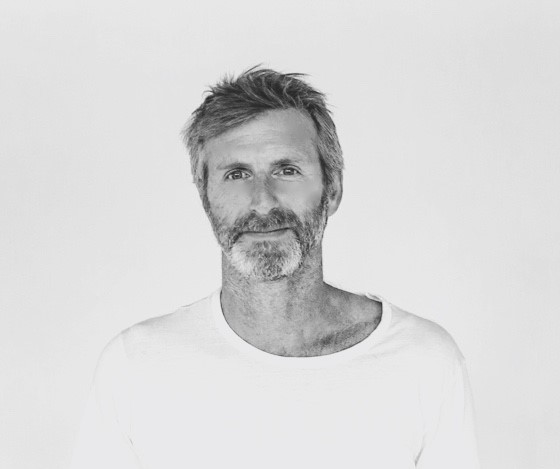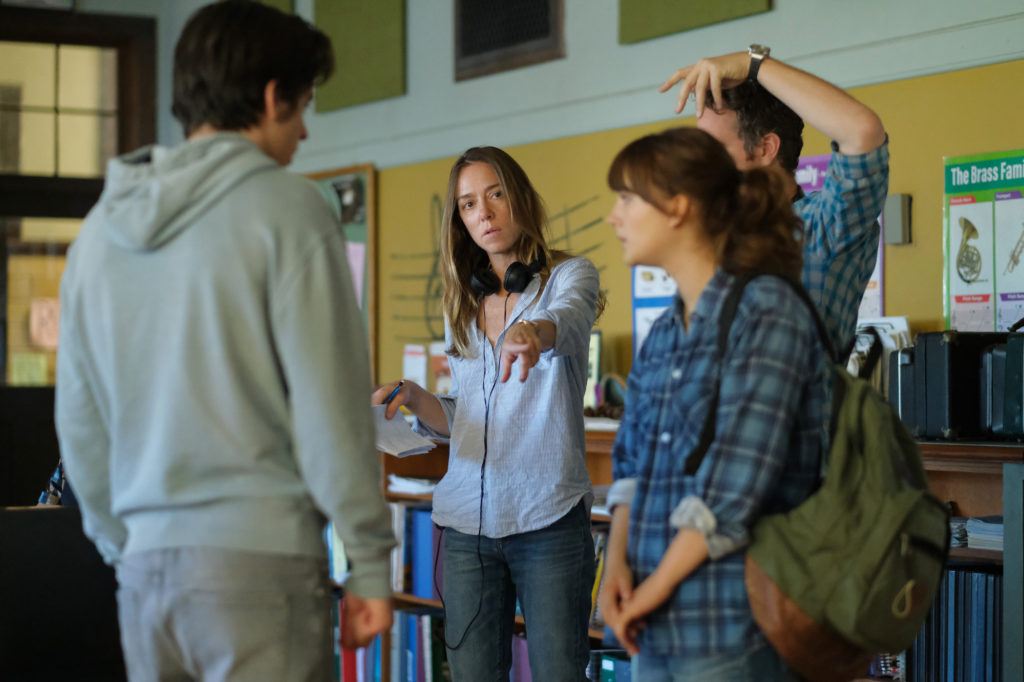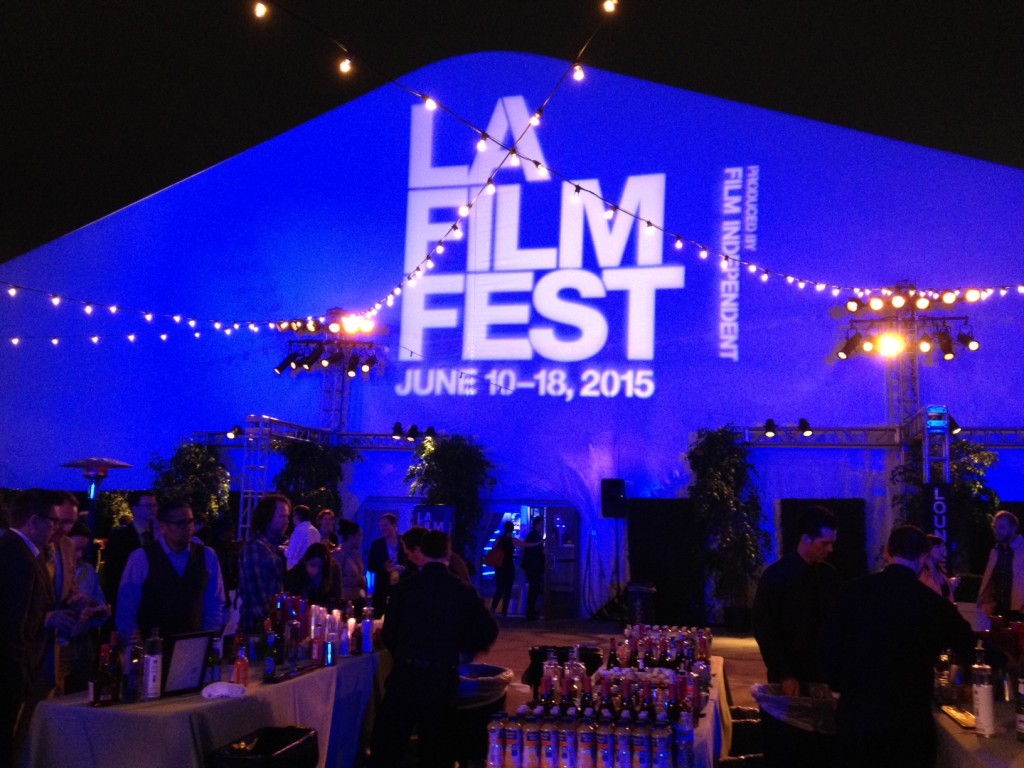It’s no secret that it takes patience and determination to get an independent movie made, but actor-turned-filmmaker ANDREW HECKLER could teach us all a thing or two about staying the course. The idea for what would become his film directorial debut first came to him back in 1996, and he tried in earnest to get that story told for close to two decades. He kept at it between acting gigs on-screen (including Armageddon and What’s Cooking?) and on stage (he founded New York’s Workhouse Theater, where he produced, directed, and act4ed in over 35 plays). It’s all paying off now that his long-awaited first film as writer/director, BURDEN, is ready for release.
Based on a true story, Burden stars Garrett Hedlund as Mike Burden, a South Carolina Ku Klux Klan member who seeks redemption and escape with the help of a single mother (Andrea Riseborough) and the Reverend David Kennedy (Forest Whitaker). Also starring Tom Wilkinson and Usher Raymond, the film premiered at the 2018 Sundance Film Festival, where it won the US Dramatic Audience Award. 101 Studios acquired Burden for distribution and will release it in theaters on February 28.
We sat down with Andrew Heckler to talk about his screenwriting and directing process, the times the film almost got made, and what it was like to finally bring his passion project to the screen.
——
COLIN McCORMACK: When and how did you first hear about the true story behind Burden?
ANDREW HECKLER: I had a theatre company and a theatre in New York, where we were writing, producing, directing, and acting in tons of plays– we were terrible fundraisers so we had to fill the stage, that was our M.O. at Workhouse. I was reading a small southern newspaper – I read a lot of these weird newspapers to look for ideas – and in 1996, I saw [the headline] “Klansman Opens Redneck Shop and KKK Museum in Small Southern Town.” I thought that was crazy, so I put it in my folder of ideas to get back to but before I could get back to it, in 1997, there was an article that said, “Klansman Sells Redneck Shop and KKK Museum to Black Baptist Minister.” I thought that was insane, so I picked up the phone and called the Reverend and I drove to South Carolina. And the reason I did that was because Billy Bob Thornton and I had met and spent a little time together as he was about to do Sling Blade, and he kept telling me, “Whatever you do if you’re going to write, get out of your apartment, go to the place – even if it’s not a true story – and feel it. Live it. Inhale it.” So I heard that in my head.
I drove down there and met these people and I spent 10 days with them the first time. Got to know the church, got to know the reverend, got to know the deacons, Clarence, who is in the movie [played by Usher]. And then I figured I better go back and see if there’s the other side to the story. Because I wasn’t making a good-versus-evil movie or a superhero movie, and if you’re an actor and you studied theater, you’re never really looking for those characters. You’re looking for something deeper. What motivates you? So using your acting experience and your training, we never say, “I’m just gonna say the lines and go home.” You go, What’s our backstory? And you dig into stuff. So I wanted to dig into this story, and I ended up actually digging into the Klan. So I went there and I called them.
CM: How do you just call up the Klan?
AH: Well, I called the Redneck Shop. They were a store. I told them I was a white supremacist from Colorado – my father lived in Colorado and there’s a lot of white supremacists there – and I was driving to Hilton Head for the summer. Could I stop through? And they said, “Sure.” So I went and spent the day with them predominantly, just sort of talking and getting to know what they’re all about, and it was very challenging to me as a person with my background and philosophies. But if I didn’t bother to get to know them, then I wasn’t really doing my job. As an actor, I would always have done it, so why wouldn’t I do it as a filmmaker? And that was incredibly informative and it lends so much depth and color to a movie that just could have been black and white; it’s sort of vibrant with gray areas of who these people are.
CM: During this time, before anyone else has signed on, you’re just doing this research and this travel on your own dime?
AH: Totally. I’m that dummy who does that. I just did it again in West Virginia. I spent my own money going down there and researching a story, paying for options and life rights.
CM: I was going to ask if you legally had to acquire [life rights] for Burden specifically?
AH: For Burden specifically, I’m not quite sure if I legally had to do anything. There were a couple of newspaper articles about it, so it was public domain. My whole thing was if I’m going to tell these three heroes’ story, then I want to honor them with some money for the story and not try to take advantage.
CM: Your initial in was through Reverend Kennedy. Did you meet Mike through the reverend?
AH: I met Mike, honestly, through the South Carolina penal system. We had corresponded quite a bit and eventually I went down and visited him and I got to know him. I literally just got off the phone with him; we’ve been friends ever since. When you see these people, where they came from, to have done this event without even knowing what the greater meaning could possibly be, you can’t help but be incredibly proud of them and proud of humanity. For me, these are three people that should not have done this, but love is a pretty powerful thing. So is hate; they’re both pretty powerful, but in this instance – and the reason this story has stayed with me for so long – the right thing happened. It’s not too often, but in this instance it did. So let’s talk about it, let’s show people there could be a pathway out of here.
CM: Once you started the process of writing the screenplay, did you have that balance down between the reverend’s story and Mike’s story, or did it evolve through the years as you kept working on it?
AH: It evolved, certainly, over the course of the unfortunate 16 years I had to develop the script. It also evolves with the characters that come to play it. So when Forest signed on in 2006 [laughs], I sort of knew who I was writing for so I could adjust the screenplay to him. He had some beautiful notes, Forest. He’s a very giving and very intelligent actor. He had some ideas for the screenplay as well and I really valued them; in fact, many of them ended up in the screenplay. So that was a benefit to me and very helpful. But as far as the story and the characters evolving, honestly, I overwrite. I know it’s a curse, especially in the editing room it becomes a huge curse, but I really gave a lot of weight to both sides so the original screenplay was in the 140-pages area. Probably too much of everybody. But I don’t try to write those fairy tale stories where boy meets girl, girl fixes boy, boy ends up in the church, then the sun comes up in the morning and we all smile and go home. I wanted to make it challenging – obviously challenging for Mike, because the whole movie is an assault on this poor guy; challenging for Judy, on who I really didn’t make it easy; and challenging for the reverend. He just can’t be a one-note character, he has to have a lot of complexity and his complexity is, Am I overcompensating to be Christ-like when I’m a man who’s been persecuted by these people my whole life?
CM: Did you always know you wanted to direct this?
AH: No, I wasn’t immune to the business of it. When I first started the project, my partner was Aaron Eckhart; him and I and a little production company that we had. Aaron was supposed to play Mike. This all happened very quickly. I finished the script, CAA loved it, Aaron was in as Mike Burden, we worked on it together. They set me up with [producer] Michael London. Catherine Hardwicke signed on [to direct] – we saw a pre-pre-preview of Thirteen and I was like, “That woman can do this movie, that’s what I want.” We went to Paramount Studios, everything was done, we were greenlit. And over the course of a weekend, we were not greenlit. That started a 16-year odyssey to get greenlit again. [Laughs]
CM: In terms of the length of time it took to make and the different benchmarks where it accelerated or took a turn, many people would probably think, when Forest Whitaker signs on, Now we’re on the fast track and it’s gonna get made! What were some other signposts of when you thought it was going to happen?
AH: This really does speak to SAGindie, but I think because the story was so compelling and the roles for the story were so thick, so dense, so rich, I honestly think the reason it kept buoyant – because the script was around from 2000 to 2016 – is because a lot of agents read Burden and if they signed a young client who’s in their mid- to late-twenties, I think that the first scripts they’d give them would be something big and then Burden. Because it is the kind of movie where if I’m a young actor who really wants to do an amazing, deep, monstrous role, that’s Mike Burden. A complex character, which you rarely get to see. So it remained buoyant. I laugh because I say we almost had the entire cast of The Avengers at one point. And that’s true, I’m not making that up. They’re all great actors and we all thought we were off to the races. When Forest signed on in 2006, we were working with a cast that had a young Channing Tatum playing Mike Burden, Forest Whitaker, Woody Harrelson, Michelle Monaghan. We were done! And then ThinkFilm fell apart.
CM: That was sort of the era where a lot of indie companies were shuttering.
AH: It does a lot of damage. There’s a lot of fallout. You read about it in a magazine or an article and you’re like, So a film company fell apart, so what? Well, so what, Burden was another ten years in the making.
CM: Were there specific things that helped keep you motivated and interested in the story as opposed to looking at the script for so long and getting burnt out?
AH: No, the message of the movie is too powerful to let go of. When it got me in ’97, it got me. As a filmmaker, if you do invest the time with the real people or the real place, it’s another anchor on you to not give up and stay determined to get something made. I had somewhat the responsibility of Mike, Judy, Reverend Kennedy, Clarence, and the congregation to make their story known. I was the guy who was going to do it and we finally got it done. The other thing, as an independent filmmaker and an actor, is the unsung role of the producer. Robbie Brenner is my producer; she is my God. Without her, none of this happens. If it’s just me banging the drum, that gets tiring for people. But she had [been nominated for] an Academy Award for Dallas Buyers Club and literally that morning in 2014 or 2015, I get a text when she was nominated saying, “You’re next.” She was attached to the project in 2004, so this is someone who’s a determined, courageous independent filmmaker. Without that, none of these movies get made.
CM: Do you think your experience as an actor helped you roll with the punches of things going high and things going low? Actors can’t put all their eggs in the basket of one role and there’s a lot of rejection – did you have a thicker skin because of that?
AH: I think we all like to think that we don’t take this personally, I think that’s the higher self of us. But as an actor also, it’s personal. If you go out for a job and you’re selling insurance and you don’t get the client, it’s the insurance you’re selling, you’re not selling you. When you’re acting and you’re auditioning, it’s personal. When you’ve written something – I’ll never forget when I finished [writing] Burden one of my best friends Kristin Ellingson read the script and she went, “This is you.” What are you talking about? This is a guy from nothing and nowhere in the middle of South Carolina. He’s a Klansman! And she goes, “Yes, but the character, the heart of him, is you.” And you realize when you are writing from a deep place, these guys are you. So it is personal and it did feel painful every time it fell apart. I would say the thing about an actor is when you don’t get the role, you don’t hang up your costume. You go back out and you audition the next day and that afternoon and if you’re lucky enough to be auditioning, you turn around and keep going no matter how much it hurts. I lost roles, but I also got roles that got cut out of big movies that would have changed my career trajectory. Such is the way of the world, you know?
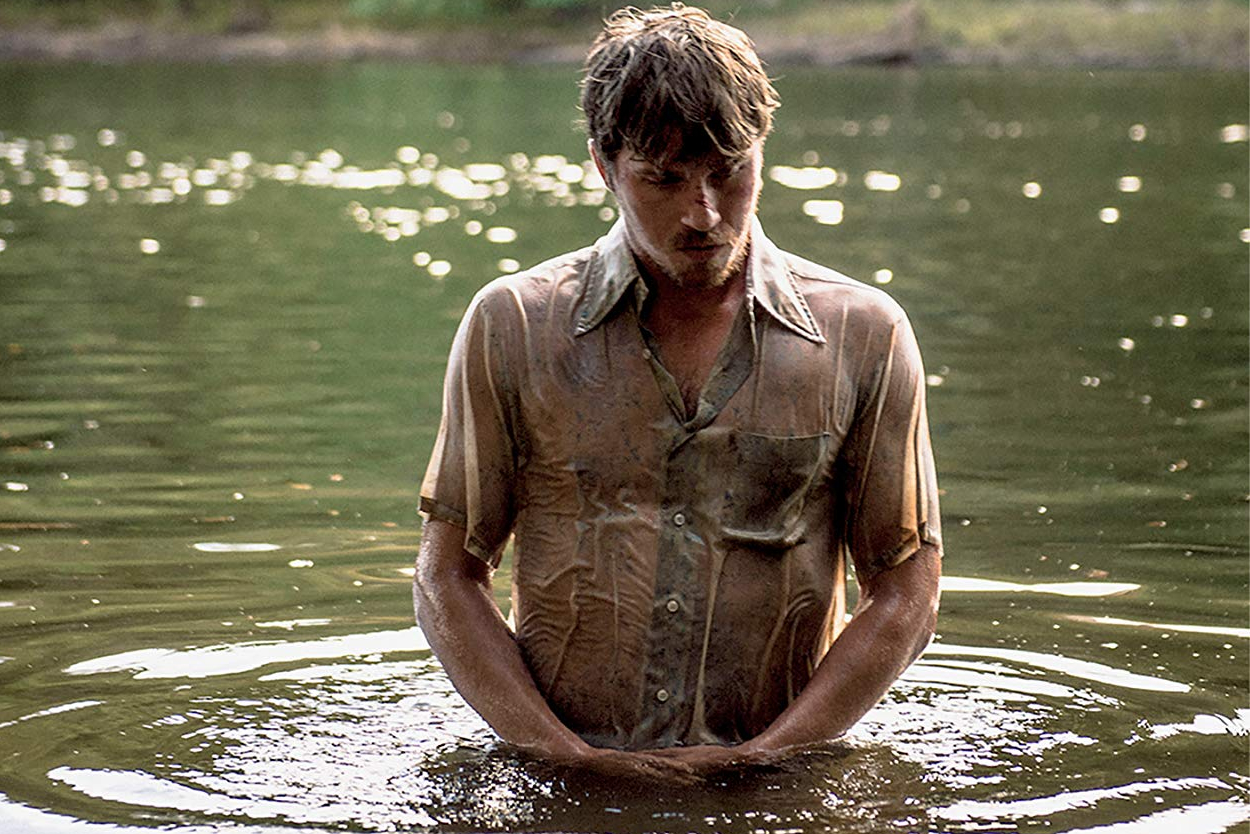
CM: Was there a specific moment where it really turned a corner where you said, “I need to direct this?”
AH: It’s pretty simple. We had just lost another director, who didn’t have that much more experience than I did. I had done a lot of theatre work and it’s an actor’s piece at its core. There was a certain part of me that wanted to put the camera on sticks and let the actors do their thing. If you’re directing anything – but especially when you’re directing these kinds of movies – if you cast really talented actors, they do 90% of the work.
Garrett Hedlund in this movie, in my opinion, he’s as good as any performance in any movie that I’ve ever seen. He’s a leading man, but this is far from leading man stuff. His work ethic was tremendous; first on the set, last to leave, every day, and giving it his all. These are not easy scenes and these are not easy things to do, and he’s just amazing. He’s a risky actor, he took a ton of chances, and the performance paid off. Andrea Riseborough is fantastic. She inhaled Judy Burden and became her and that takes an inordinate amount of talent, especially because she also is from a very different background. Tom Wilkinson did exactly what I wanted Tom to do, which is to play a father and not a monster. He paid a father who was losing his son. Crystal Fox, Austin Hébert, Usher. You realize you don’t get to be Usher by being lazy; this guy put in all of his energy and came completely prepared to play. And I mentioned him before, but when you get Forest Whitaker, you’re lucky. Because Forest Whitaker comes and he’s a very thoughtful, quiet, Method kind of actor, so he comes as the character.
You have very little to do but situationally put them in the right places and let them do what they’re going to do. We did it very much like improv theatre. Two cameras always. Tom used to always say, “Am I on camera for this shot?” And I’d say, “I don’t know.” And that was not fun for Tom. But we did a lot of that. I wanted to run it like a play, very much like a theatrical piece. We hadn’t blocked much before we would get on set. We’d let them roam and find what they wanted to do and then we would adjust from there. So we’d let the actors act first and foremost and then we’d adjust for camera or positioning or tension in the scene itself.
CM: When I talk to directors who have acting backgrounds, I always like to ask about how they approach the casting process from the other side of the table.
AH: With respect [laughs]. That’s the one thing. Having an actor’s background, I can’t tell you how invaluable it is. If you’re a director who comes from the other side, you should take acting classes and maybe do a couple of auditions. Because I want everybody to feel comfortable. What you don’t realize as an actor, you just don’t – you get all nervous and, These people aren’t going to like me, and this and that – what you don’t realize until you get to the other side of the table is they’re rooting for you. We’re rooting for you to come in and do something cool. We’re not sitting there like, “I don’t like that guy.” We’re waiting for the right person to walk in and give it all. I say take chances, take risks, dig deep. That was really important in the auditioning process. I would joke around with everybody, I would talk to everybody, I got yelled at all the time for taking too long with everybody. Because I just don’t like the idea that it’s a meat wagon, Come in, come out, come in, yeah, yeah. I will say, it is true from almost the moment someone walks in the room, you know. You almost know right away.
On the other side of the coin, when you get on set, one of the things I demanded is once I’m good, once I have what I want as a director, I would always say to everybody, “Who needs one more?” And I’d let the actors decide when they were finished too. That is a nightmare for an AD, but it was something that really created a much more comfortable working relationship with the actors, where they felt respected enough and heard enough that they could do their best work. Trust is a word that we throw around pretty lightly, but in order for people to give you their best, whether it’s on set with actors or at home with your family, it’s all about trust. If they trust you, they’ll let you go.
CM: Did you have time to do any formal rehearsal before filming began?
AH: Not so much. Tom is in England. Forest Whitaker tends to work a little bit. I mean, jeez, the motivating factor for us to shoot was that Forest had a three-week window. So we didn’t have a heck of a lot of time. We would rehearse every day on set and do quite a bit of improv work. We’d rehearsed enough that Andrea especially was great about looking at the script and going, “Can I say less here?” and we would adjust. “Can I say more?” or “Can I say this?” I wasn’t very precious. I wanted them to say my words and then we could improv off them.
CM: Was the location scouting process difficult?
AH: The location process for me was challenging because I just didn’t understand it. It sounds terrible, and I apologize to all locations people in advance, but I didn’t understand seeing places that had been used over and over and over again for movies. We ended up befriending the waitress at the local coffee shop. She introduced me to her father-in-law, who was the sheriff, and he and I drove around that area forever. I would explain to him the character of Mike Burden or the character of the reverend and he would go, “Oh yeah, I know who that guy is.” And he would drive me to their house and we’d knock on the door. So the reverend’s house is a reverend’s house in the movie. Plantation Concrete, which is where the Klan is [based in the movie], that was me in a locations van driving by and going, “Stop!” And going randomly and knocking on a door. When I knocked on the door of that place, there was a dog inside going ballistic and I thought, I’m going to get killed here. This woman opened the door and she said, “What ya’ll want?” I said, “We’re looking for a place to shoot a movie with a lot of character.” And she said, “You lookin’ for a shithole? ‘Cause this here is a shithole.” And I said, “Well I wouldn’t say that, but yeah, I guess.” And that’s the place we used. It wasn’t [a shithole], and we ended up putting the family in the movie, all the kids are their kids and they’re all sitting around in the movie. It was part of the environment for me to welcome in [the community]. You don’t want to impose your will on people, you want to be symbiotic and that’s how we got a lot of flavor in the movie.
CM: When you were finally on set after the 16-year lead-up and you’re making the movie, were you able to step back and appreciate it and have fun, or are you so busy you’re focused at the job at hand and it’s only later you can reflect on it all?
AH: When I got up to make the first speech in front of cast and crew, we all got together and it was the first big meeting and I got up and I actually couldn’t talk. It was too emotional for me, to see this after all these years, everybody there ready to go. And it was like that for the entire shoot. I think I said, that kind of passion and commitment bleeds. They all put their best effort in 100%, actors, crew, and everybody else. Either they felt sorry for me that I had to wait that long, or they felt the passion that I had for the story. They had met the real people, too, we brought them down, so there was a responsibility to tell it.
I was leaving to go do the movie after all this time and before I left my wife said, “Listen to me. You’ve been at this for almost half your life. You can’t control a lot of things that are going to happen. You can’t control whether the movie is good or bad. What you can control is I want you to go down there and have fun. Enjoy the experience of making this film. No one can take that away from you.” And I gotta tell you, it’s a really tough movie; there are tough scenes, there’s violence, there’s heavy language, there’s a lot of tension, and we had a hell of a good time making a really tough movie. For lunch breaks I would have a speaker, we would dance, I would be singing, all the extras would dance together. I shot the whole movie barefoot, which everybody thought was hilarious. Usher, especially, appreciated that. He’d say, “When Andrew takes his shoes off, you know we’re cooking.” When Forest left the set – and he may get sainted, he does so much humanitarian work and is a very thoughtful, introspective guy – we had dinner the night he left. I told him the story about my wife and he laughed – he had shaken off the reverend’s character and was Forest Whitaker again and he’s way younger and much more energetic – he laughed and said, “Tell you one thing, you sure had fun making this movie. I don’t think I’ve ever seen anybody have as much fun as you did making this film.” It was really important to me and I think it’s important for everybody.
In the theatre, when you’re rehearsing a comedy it’s really funny and fun and when you perform a comedy your life goes to hell; when you rehearse a drama your life goes to hell and when you perform a drama your life gets fun. I think we all need that release. So between these heavy, heavy scenes, we’d just have a good time. Dexter Darden, who plays the reverend’s son, his idol was Usher, so a lot of times he’d perform Usher for Usher. It was awesome and we just had a good time. Those improv scenes couldn’t have been as lively without us enjoying each other’s company.
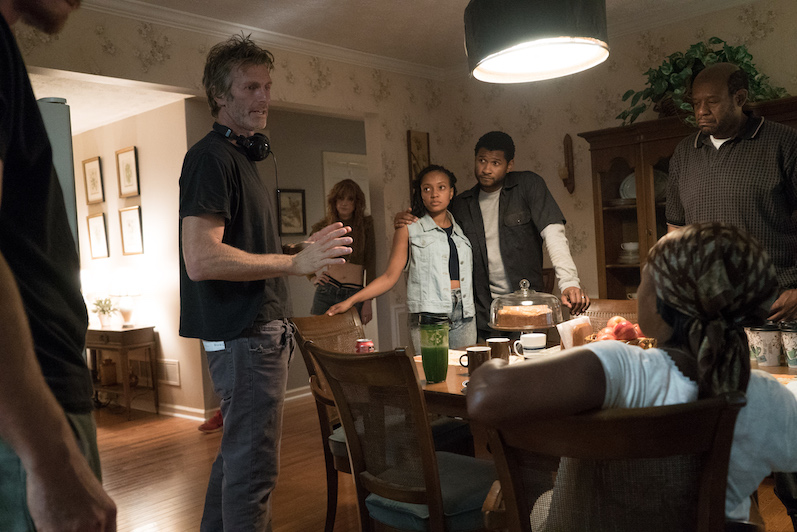
CM: So what’s next for you?
AH: I was riding around with the sheriff and I asked him, “What goes on down here? Cow-tipping? Mailbox-smashing? What is it?” And he said, “Actually, it’s heroin.” So he told me from a small-town sheriff perspective what happened down there with drugs, pills, meth, heroin, everything. And it just made me upset. So I took all that anger and went to West Virginia and met with victims of all the drugs and opioids down there, I met with the lawyers who first sued the companies, and I wrote a script called Damage Done. We’re pretty much cast up and we’re trying to get that made. It makes Burden look like a romantic comedy. It’s tough, but it’s the truth. And I think audiences are ready for truth.
__
Thanks to Andrew for talking to us about BURDEN. Follow the film on Twitter, Facebook, or Instagram.
This interview has been edited for clarity.
If you’re an independent filmmaker or know of an independent film-related topic we should write about, email blogadmin@sagindie.org for consideration.

